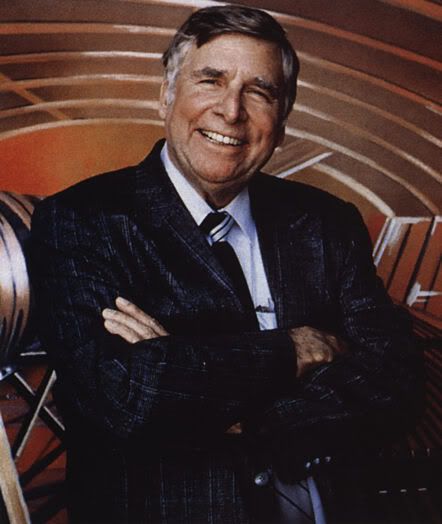Gene Roddenberry's Atheism: In his own words

-------------------
My family was from the South. My mother was very religious. Every Sunday we went to church, Baptist church. I didn't really take religion that seriously. It was obvious to me, almost from the first, that there were certain things that needed explaining and thinking on, but why bother about them? I was a child. Life was interesting and pleasant.
I think the first time I really became aware of religion, other than the little things you do as a child because Mom says to do it (it was mostly Mom) was when I went to church. In my early teens I decided to listen to the sermon. I guess I was around 14 and emerging as a personality. I never really paid much attention to the sermon before. I was more interested in the deacon's daughter and what we might be doing between services.
I listened to the sermon, and I remember complete astonishment because what they were talking about were things that were just crazy. It was communion time, where you eat this wafer and are supposed to be eating the body of Christ and drinking his blood. My first impression was, "This is a bunch of cannibals they've put me down among!" For some time, I puzzled over this and puzzled over why they were saying these things, because the connection between what they were saying and reality was very tenuous. How the hell did Jesus become something to be eaten?
I guess from that time it was clear to me that religion was largely nonsense, largely magical, superstitious things. In my own teen life, I just couldn't see any point in adopting something based on magic, which was obviously phony and superstitious.
I don't remember ever being serious about any of those things. When I sang in the choir, we made up cowboy words to the choir songs. The rest of the choir would be singing "Holy, Holy Jesus," and we would be singing something entirely different.
At five years old I was serious about Santa Claus, but at five and a half I learned it was nonsense. Writers often write these as weighty moments, but in my experience they're not. Santa Claus doesn't exist. Yes, I think back now that there were all sorts of reasons he could not exist and maybe have a little sadness that he is gone, but then I think the same thing about Jesus and the church.
So my thinking about religion sort of stultified at that time and I just decided not to pay any attention to it. I stopped going to church as soon as it became possible for me to do things on my own as a teenager. I made up my mind that church, and probably largely the Bible, was not for me. I did not go back to even thinking much about it for years. If people need religion, ignore them and maybe they will ignore you and you can go on with your life.

I can't say I didn't care about it or examine it; I just let it pass lightly over me. Religion was so full of inconsistencies that I could see no point in arguing each inconsistency out. It was background noise that you ignore.
I've been thinking about how I said that religion seemed pretty foolish to me for most of my life. Indeed, it did, but then comes the question of why didn't I take a stand against it? I used religion several times in Have Gun, Will Travel. Once in a penitentiary where a pastor was trying to keep a fellow from being hung, I wrote that the pastor grabbed a hacksaw blade, was cut by it, and was bleeding. I had him make some comment about blood and salvation. It's not that I actually believed in blood and salvation being connected, but that was the way the audience believed and I can remember going out of my way not to deal directly with what my thoughts were for several reasons.
There will always be the fundamentalism and the religious right, but I think there has been too much of it. I keep hoping that it is temporary foolishness. Some of it will always be around because there will always be people who are so mean-spirited and such limited thinkers that their religious beliefs seem so logical: that there is a god, and so forth, that nothing else in their limited concept can explain what the existence of a god can. There's been a lot of it lately: Youth for Christ and that sort of thing. I'm hoping that this is just a bump in time.
Of course, the only thing that will keep such things from continuing and growing is education. Dewey was right about that. Unless we have an educated populace, there's no telling what may come along. The pressures of life are so great that a certain percentage of all these uneducated people will come up with strange ideas. Strange, violent ideas. They seem to have good answers for all of our problems. I don't think life's problems are such that we have to rely on simplistic answers instead of thinking things through. I think these things will be found in proportion to and in reverse order of how well we educate ---populace.

Source: Humanist 1991 interview by David Alexander.
--------------
Comments and Reviews
--------------




